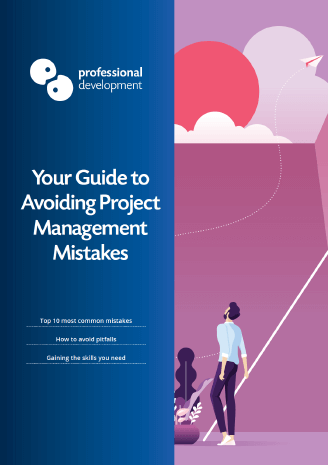What is a project pitfall?
Often called “pitfalls”, these mistakes are important areas or tasks within a project that can be mismanaged, given little attention, or overlooked altogether.
On the surface, some of these mistakes may seem small, or worth little attention. However, they are called pitfalls because ignoring or mishandling them can derail your project in minor or major ways.
Becoming aware of the kinds of pitfalls you can stray into is the first step to avoiding them completely.
Addressing each of these important factors can add up to big improvements, contributing to vastly more successful projects overall.
What are the 10 most common project management mistakes?
There are many pitfalls that may occur, depending on the nature of your project and working environment.
However, there are some mistakes that all project teams need to be on the lookout for at all times. Here are our top 10 most common mistakes:
- 1. Unclear goals & lack of scope detail
- 2. Vague planning
- 3. Poor communication
- 4. Not assembling the right team
- 5. Poorly defined roles and tasks
- 6. Unrealistic targets
- 7. Skimming over risk management
- 8. Bottlenecks to productivity
- 9. Lazy stakeholder engagement
- 10. Failure to “close” the project
Let's take a closer look at each and examine why these mistakes can have such a negative impact on your work.
1. Unclear Goals and Lack of Scope Detail
It is important to take time at the beginning of your project to properly define your goals and scope out the project in detail.
Rushing this step is a mistake that can have negative effects that ripple out across your project’s life cycle.
Taking the time to define very clear goals and scope ensures that both project team and stakeholders have the same game plan and expectations from Day 1.
2. Vague Planning
Once you have defined a project’s scope and objectives, it’s time to plan its implementation.
Factors for consideration here include:
- Resources: personnel, materials. etc.
- Budget
- Timelines and Deadlines
- Frameworks to be utilised
As with scope, it’s essential to take time here and map out what it will take to achieve your aims.
Mishandled resource management can result in missed deadlines, budget overshoot, and even a failure to attain project goals.
3. Poor communication
The best project teams communicate and collaborate frequently in order to gain the best results.
Without open channels of communication, mistakes are easily made. Questions can go unanswered, and incorrect assumptions can happen.
Providing your team with regular opportunities to share ideas and solutions and communicate queries and issues can transform their working dynamic.
4. Not assembling the right team
When planning a project, you must ensure that you’re choosing the right people for the right tasks.
It is crucial to consider the skills and expertise you will require to reach your project objectives and recruit a combination of team members that meet the criteria.
If possible, it’s best to combine a mix of experienced and new project managers on a team. This way, the more seasoned team members can mentor the new.
In turn, the enthusiasm and fresh ideas that new personnel bring can expand what’s possible for the team to achieve.
5. Poorly defined roles and tasks
Once you have assembled your best team, they need to become very familiar with the project plan – ideally in an environment where they can ask questions and request clarification or support in a given area.
Holding a project initiation meeting helps to avoid confusion over “who is doing what”.
6. Unrealistic Targets
It can be so tempting to select early deadlines and super-low budgets when planning your project.
However, it’s crucial that for this part of your planning you are very realistic, erring on the side of caution where possible.
It’s better to finish on time, or within budget – or indeed, to pleasantly surprise all stakeholders by coming in early and under budget – with a lower stress level and margin to allow for obstacles as you work through the budget.
7. Skimming over risk management
The importance of time spent assessing potential risks and planning contingencies cannot be overstated.
Having a plan for the “unlikely but possible” and “completely unexpected” can mean the difference between scaling an obstacle easily and failing completely.
Risk management is such an important factor for project success that we include a module for it on every single project management course we run.
8. Bottlenecks to productivity
If you’re heading up a project team, trying to do everything yourself is an all too common mistake.
It’s understandable, as sometimes the explaining and managing of tasks may appear to take longer than just doing the job yourself.
Don’t fall for it though; nothing is more of a barrier to productivity than lack of delegation.
Identify ideal candidates for particular tasks within your team, be clear about who owns which responsibility, and trust them to get to work.
9. Lazy stakeholder engagement
Failure to engage with a project’s stakeholders regularly throughout a project can lead to miscommunication, unrealistic expectations, disappointments, and frustration on all sides.
In recent years, the term “stakeholder management” has gone out of fashion in favour of the more appropriate “stakeholder engagement”.
“Stakeholder management” seems like a chore to carry out, another item on an endless to-do list.
However, stakeholders are immeasurably valuable to a project’s success. They can provide input and insight that may not be available to the project team.
Communicating regularly with all project stakeholders from an early stage of the project is wise.
10. Failure to “Close” the project
It can be very tempting to fire ahead to the next project or task, once you have arrived at a current project’s goal.
However, skipping the project close step is a huge missed opportunity.
Spending time in the closing stages allows the team to review the project cycle, evaluating what worked and identifying weaknesses.
The strengths and successes – some of which can be pleasant surprises at a project’s closing review – can be brought confidently into the next initiative.
Discovering areas of weakness or gaps in knowledge here is of great benefit. It prompts a strategy to address these gaps, such as a change in approach next time or supportive training for individuals or the team as a whole.
How to Avoid These Pitfalls
We have given some initial hints and suggestions to the solutions for each project management mistake above.
To truly combat these missteps, we recommend this 3-point strategy:
1. Become aware of the potential pitfalls in your projects.
Using the above as a guideline, evaluate areas in your projects that may be lacking in attention or structure.
If you have previous projects to draw from, these are an excellent way to gather data about repeating patterns.
2. Identify and fill the gaps
From what you learn in step 1, make a list of the skills and resources you need to navigate these challenges effectively.
Make project management training a priority to expand and strengthen your skillset – and that of your team - in these areas. (take a look below for some inspiration).
3. Implement – review – implement – review – repeat
A continuous improvement mindset is a true ally when mistake-proofing your projects.
Put the knowledge and skills gained from steps 1 and 2 into practice. In your next project’s closing stage, review how the changes impacted the work and outcome.
Repeat this process on an ongoing basis for smooth-running, high-achieving projects.
Developing the Skills You Need
So you’re ready to begin building defences against project management pitfalls. Where should you begin?
Our QQI Certified Project Management Course is a structured, yet intensively practical way to expand your skills for this task.
You can even apply the learning to a live project.
Course Content Highlights:
- Project Initiation
- Stakeholder Engagement
- Scope Management
- Cost Management
- Risk Management
- Managing Project Teams
- Change Management
- Closing the Project
This is just a small sample of what is covered during our 4-day course. For a full, detailed look at the course content, we recommend downloading our PDF brochure.
Further Reading and Resources
Here are three resource areas for the next steps in perfecting your projects.
Get Advice
Talk to our training consultants about the best way to bolster your skills through project management training and certification.
You can reach us online, using the Ask a Question button below, or call us at Freephone 1800 910 810.
Ask a Question
Read On
As you might imagine, we are fans of continuous learning! Here are some follow-on recommendations from this article:
You can also sign up to receive updates from us on all things project management. Never miss an article, update, or special offer with our timely email updates.
Get Updates
Download a Guide
Instantly download our Guide to Avoiding Project Management Mistakes using the button below.
This guide is a handy way to keep the information in this article at your fingertips as you plan and execute projects.
Get a Guide













